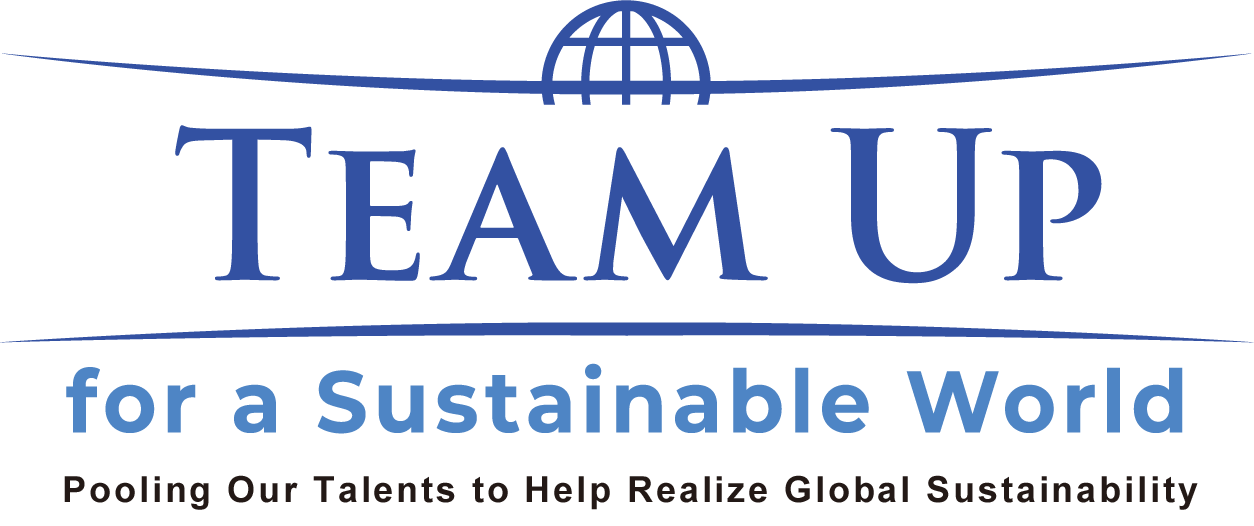TEAM UP for a Sustainable World:Land-based Salmon-Farming Business
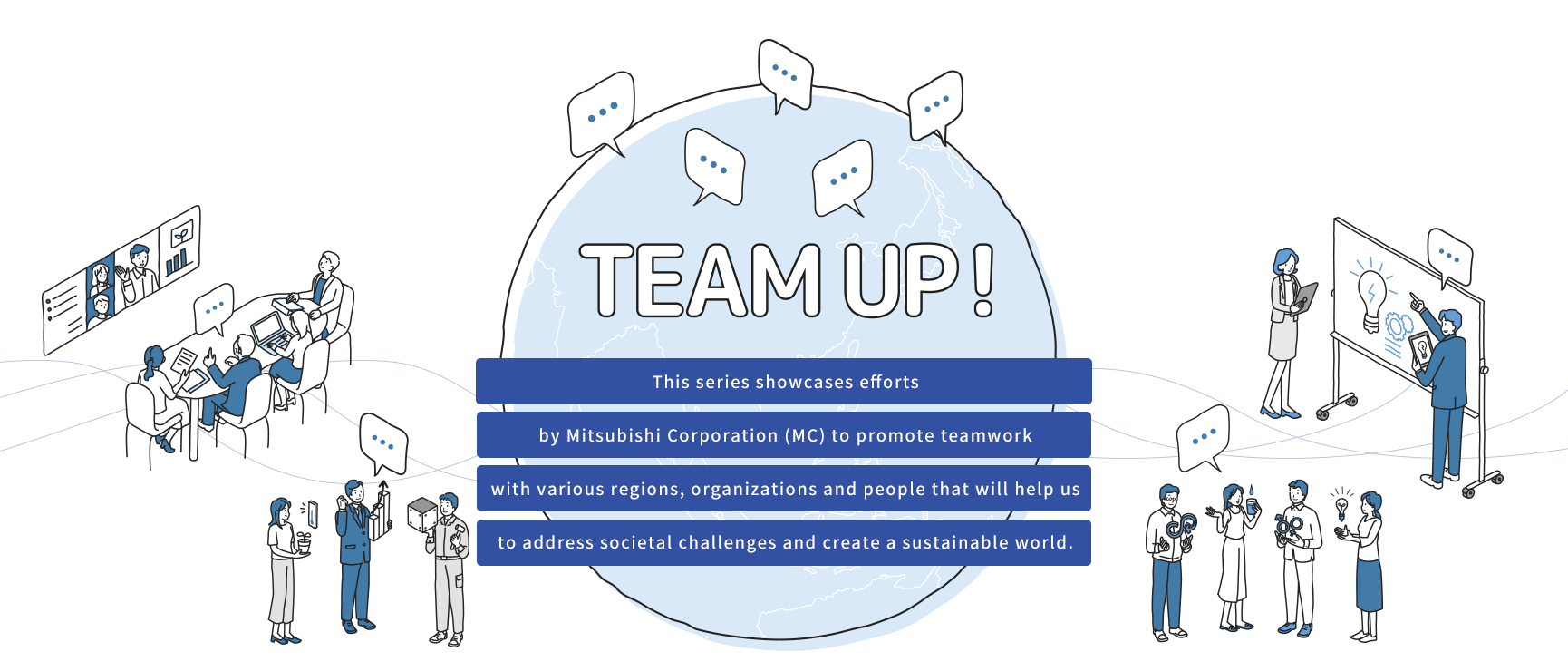
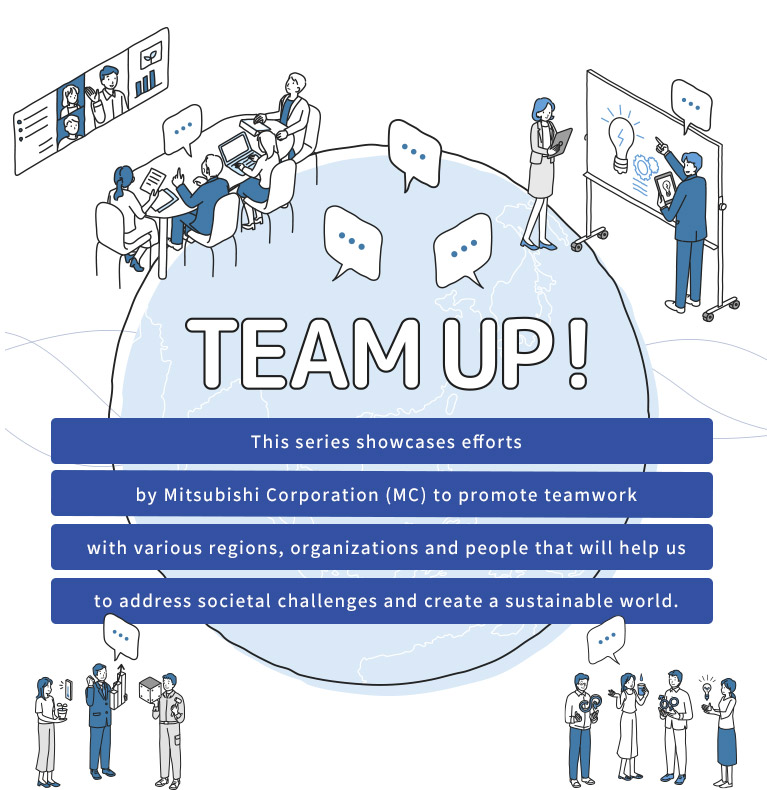
Using Land-based Aquaculture to Restore Japan's Position as a Seafood Heavyweight TEAM UP for a Sustainable World
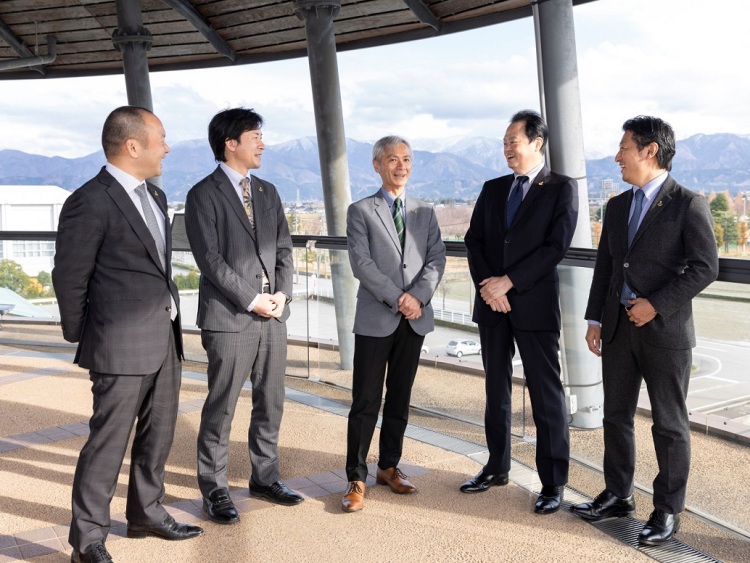
Land-based Salmon-Farming Business (3)
We are now just two years away from the scheduled launch of operations at the land-based salmon farming facility in Toyama Prefecture's Nyuzen Town. This is one of the largest aquaculture operations in Japan, but exactly what value will it deliver to the region? What impacts will it have on global aquaculture? In part two of our roundtable discussion, the participants share their own expectations of the business and how they see it reshaping the future of sustainability and localized production.
- Roundtable Participants
-
Ryoichi Tanaka (Nyuzen Town Kirakira Commerce and Tourism Section Manager)
Naohisa Kasuga (Outside Director, ATLAND; on secondment from Maruha Nichiro)
Makoto Mitarai (Executive Vice President, ATLAND; on secondment from Maruha Nichiro)
Kengo Morimoto (Team Leader, Tuna & Seafood Products Team, Produce & Marine Products Department(At the time of the discussion))
Takeshi Maruyama (President and Representative Director, ATLAND; on secondment from MC)
- Interviewer
- Kazuhiro Sekine (GLOBE+ Editor in Chief)
The Benefits of Producing Salmon Locally for Local Consumption
—— Please explain the significance of this project, with respect to local production for local consumption.
Mitarai Marine resources have been declining globally in recent years, so there are big expectations for land-based fish-farming businesses to both stabilize and localize production. Some people might assume there won't be any problems as long as harvests from countries like Norway and Chile remain stable, but flying those products all the way to Japan will be the burden on the environment, plus the price of salmon will hinge on the prices of oil and other fuels. Furthermore, exports of those foreign yields have to be balanced to meet demand for salmon in other countries as well. Atland and Maruha Nichiro share the same mission, namely to localize production for local consumption while providing Japanese people with a stable supply of high-quality fish protein.
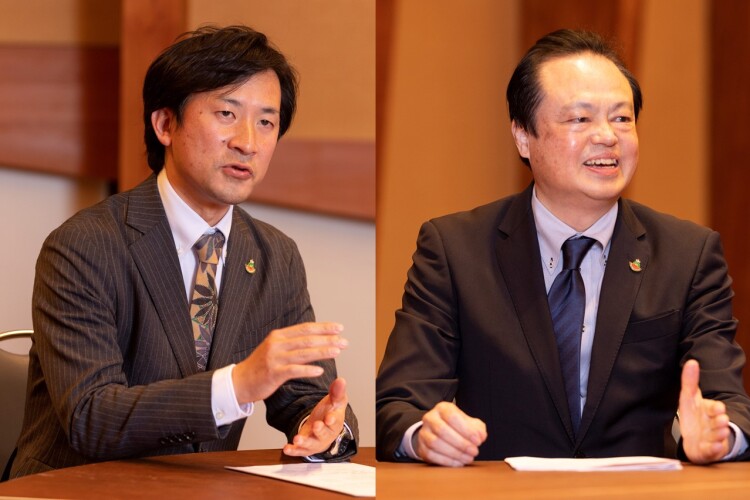
Morimoto Atland's vision for this local-production-for-local-consumption model encompasses not only Toyama Prefecture and other parts of Japan, but the rest of Asia as well. We are planning to export the Atlantic Salmon raised in Nyuzen Town to Korea, China and Southeast Asia. Both Maruha Nichiro and MC have distribution networks throughout the region, so we are keen to take advantage of those to grow our sales. Moreover, as we do that, we also intend to leverage town's bountiful natural resources to solidify Nyuzen salmon as an eco-friendly and ethical brand, because we want everyone who eats the fish to know and appreciate its back story. Our goal is for land-based aquaculture to give back to Nyuzen Town by boosting its value and international appeal.
How Will a Land-based Salmon Farm Change the Region?
——Speaking of giving back to the region, how will this business change Nyuzen Town, in terms of revitalize regional communities?
Morimoto Atland's land-based salmon-farming operations are truly cutting edge, because they employ the world's most advanced aquaculture technologies. Because this project is likely to attract a great deal of attention throughout the global seafood industry, we will probably see more business missions and tourists visiting Nyuzen Town in the future, primarily from countries like Norway and Chile. Having said that, we want the locals to the first ones to see the facilities, because it's important to us that all generations in Nyuzen understand what a great thing their region is doing. It would be wonderful if this business can help to build hometown pride. I should also mention that because the green and blue wavelengths comprise the optimum range of the visible light spectrum for land-based aquaculture, the inside of the facility will appear really futuristic, so it's going to look great in photographs (laughs). I think it will be an enthralling visual experience for visitors. Kasuga I think broadcasting the fact that the "Nyuzen Model" represents a new model of aquaculture is going to draw people to this cutting-edge facility, not just from around Japan, but from other parts of the world as well. There's every chance that it could also stimulate the so-called "u-turn" and "i-turn" migrations of job seekers to the area, meaning those who used to live here and decide to come back, and people who will be completely new to the area. I hope we'll see a lot of children and students visit the facility too, and just general growth in interest in this business.
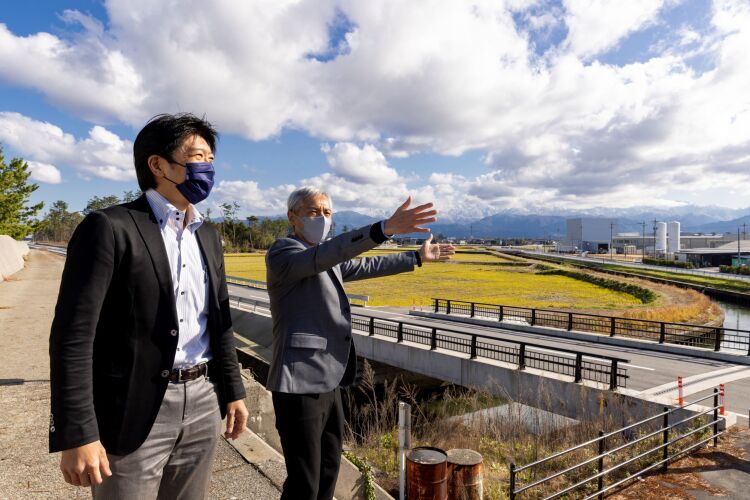
——What are the municipal authorities' expectations of this land-based salmon-farming business?
Tanaka Nyuzen Town will be the birthplace of a new industry, so this business is going to put the spotlight back on its deep seawater, ground water and other natural resources. As Mr. Morimoto mentioned, this is going to instill residents with even more pride and love for their town. As long as people feel a deep sense of attachment to their hometowns, those who leave for school, work or any other reason will always long to return one day. This business has the potential to spread the appeal of Nyuzen Town and trigger that u-turn migration that Mr. Kasuga touched on. Personally, I think hometown affection is a very important factor in securing regional stability and development. I'm also excited about it bringing in more tourists, because we'd like people not only to experience Nyuzen Town's delicious food, but also to develop an interest in its natural resources, which I mentioned. They can also tour and even drink from the town's natural springs and visit the Sawa Sugi (Japanese Cedar) community garden, which is a near-native cedar forest found growing on a belt of flatland springs, something rarely seen anywhere, including here in Japan.
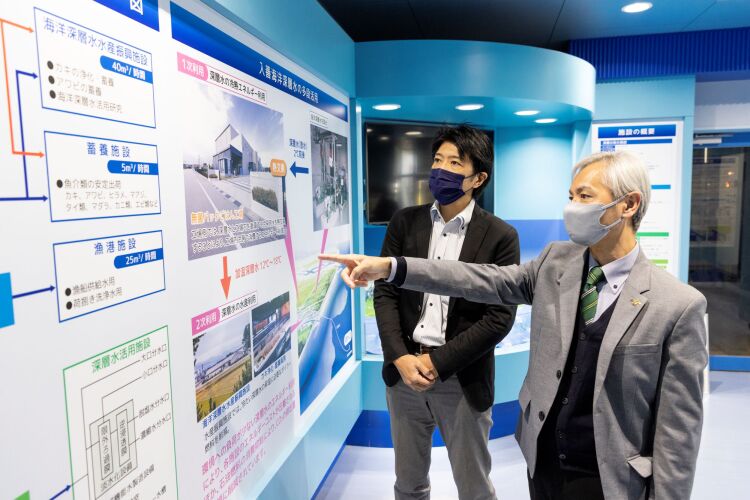
Strong Teamwork Fueling Optimism
—— When I listen to you all, I get the impression that you have excellent teamwork, even though you come from different organizations with different priorities. What's the secret to that?
Kasuga I think the fact that we all respect one another's expertise is a big point. That respect is what prevents us from overlooking any risks or delaying our responses to issues that come up, and it's also why we're able to speak frankly with one another. I agree that our teamwork has been excellent. Mitarai Obviously this business needs relationships that cut across our companies' organizational boundaries, but cooperation from the Town's officials has also been essential. When you're building one of Japan's largest land-based aquaculture businesses, there are going to be things that you're unfamiliar with and have to learn as you go. We've been feeling our way along at times, so the support from the local authorities has been really valuable. Everytime we've had an issue, we've been able to consult with Mr. Tanaka, who has been extremely cordial with us. He's pointed us in the right direction, explained what's possible, and been generally very positive with his responses. I honestly don't recall him ever saying, "No, that's just not possible" (laughs). Needless to say, we're really grateful to him, and I'm convinced that our team is capable of handling more tough challenges.
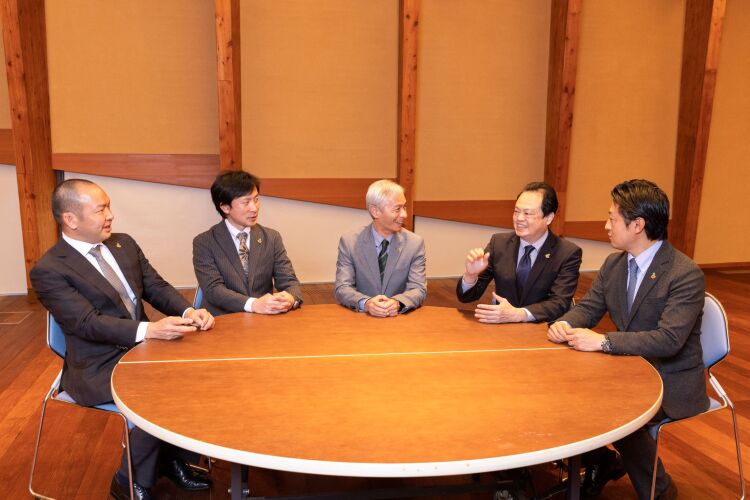
Tanaka Thank you, Mr. Mitarai. Nyuzen Town has always worked hard at attracting corporate interest, and generally speaking, we look at new businesses as opportunities that are worth taking a chance on. Once we decide to move forward with one, we offer it our full support to ensure that negotiations with the prefectural authorities, legal procedures and other requirements are performed as swiftly and efficiently as possible. We're also confident that we can provide useful systems related support. We've had a lot of meetings over the last three years, even with the pandemic restrictions in place. I think the fact that we have such a candid relationship is precisely why we've managed to overcome so many barriers and get to this point. Our teamwork is every bit as meaningful to me, and I look forward to strengthening it even more as this business progresses.
Challenges Ahead of 2025 Launch Date
—— Production is scheduled to begin in 2025. What issues to you anticipate having to deal with in the meantime?
Morimoto The key to aquaculture is securing eggs, feed and a nurturing environment. We've cleared the environmental requirement thanks to Nyuzen Town's exceptional setting and the expertise at Maruha Nichiro and Cermaq, but there are still big challenges ahead with respect to the other two. First we have to import the Atlantic Salmon eggs. The trouble is there are currently only three countries in the world that export them, namely the US, Canada and Iceland, which means we're going to have to increase our supply sources. As for the feed, the question is how to procure a stable supply of that conducive to a land-based aquaculture facility and the optimal nutritional requirements of Atlantic Salmon. Right now we're working feverishly to answer that question, and we're relying on concerned interests both within and outside our group for cooperation and advice. If we hope to launch production in 2025, then we have no time to waste.
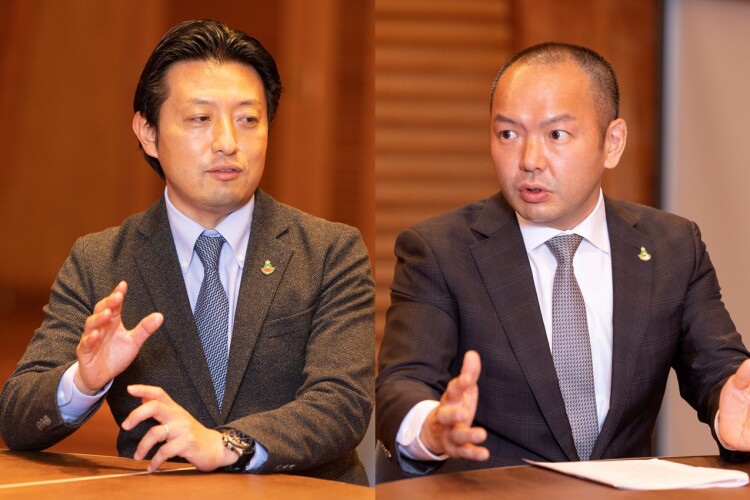
Kasuga Exactly. Since 2017, Maruha Nichiro has been conducting a pilot project at a land-based Cherry Salmon aquaculture facility. Although it involves a different type of salmon, I think the experience we've gained on the project should prove useful in our Nyuzen Town business. It was the first fish-farming operation in Japan to gain certification from the Aquaculture Stewardship Council (ASC), which acknowledges sustainable and socially responsible aquaculture that respects things like the natural environment, workers' rights, and so on. Maruyama We've received assistance from the workers at Maruha Nichiro's pilot project, which is located in Yuza Town, Yamagata Prefecture. Thanks to their cooperation, we've already begun our trials of farmed Atlantic Salmon. We're keen to build up know-how and experience ahead of our official launch date in 2025.
Outlook for Land-based Salmon Farming
—— What do you think the future has in store for this land-based aquaculture business?
Mitarai My biggest hope is that Atland's businesses can restore Japan's reputation as a world leader in seafood technologies. We have a lot of competitors in land-based aquaculture, both here in Japan and around the globe, but if we are innovative enough with this business, then we can make that happen. I also want this business to put Nyuzen Town on the world map and promote growth for both Atland and the region. That's the future I'm hoping for, and I'm going to do everything I can to help realize it. Kasuga The future I'm hoping for is one with rejuvenated Japanese fishing and aquaculture industries, which have been on the decline in recent years due in part to the shrinking labor force. I'd like Japan to bounce back and once again be a world leader in both of those industries, which is why I'm determined to see Atland's new "Nyuzen Model" become a success.
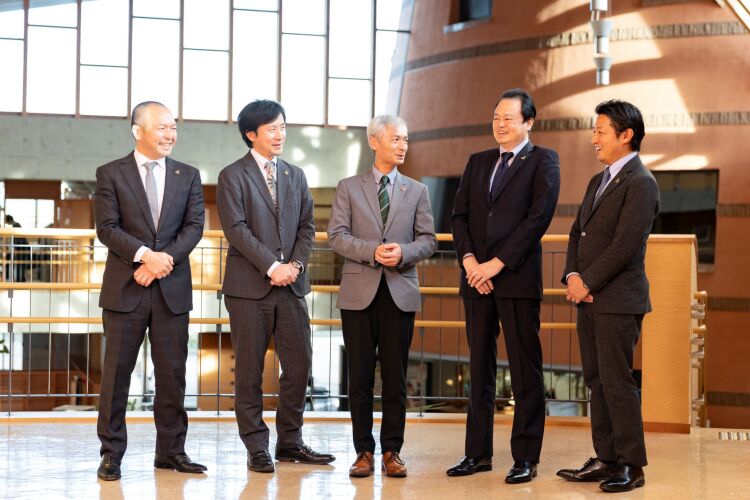
Tanaka My mission is to enhance Nyuzen Town's value and ensure that value is inherited by its future generations. To achieve that mission, one thing I've been striving for is stronger connections between the town's businesses. If local companies can collaborate more with one another, I think the benefits gained will be even greater than any achieved thus far, so I'm anxious to use this land-based aquaculture business as a springboard to more joint projects. Morimoto I think there are a lot of reasons we need to make this business sustainable. For example, this endeavor will give back to our natural environment through its responsible use and processing of the region's deep sea and ground water, which as we've mentioned are precious natural resources. The scraps left over from processing the fish can also be turned into fish meal, and if that can be used as feed for Atlantic Salmon, then we can recycle protein. I hope that we can also utilize MC's and Maruha Nichiro's unused resources to create a recycling-oriented business. The most important and challenging aim is sustainable talent. Obviously we need excellent people to launch this kind of business, but we must also ensure a succession of talent capable of maintaining its success for generations to come. At MC, we will continue to do our best to nurture future business leaders. Maruyama Atland's plan is to grow the Atlantic Salmon at this land-based facility to between four and five kilograms per fish, with an annual production target of 2,500 tons. In truth though, there are very few similar aquaculture businesses in the world that have managed annual yields of at least a thousand tons, so daily operations are going to be very challenging, and we're certain to encounter our fair share of problems. In the future, I hope that this business will be a major contributor to both the Japanese and global seafood industry, but our goals right now are to begin production in 2025 and start shipping our product in 2027. Our team will be taking steady steps to achieve those goals because we are fully committed to the business's success. Don't be surprised if you're soon hearing a lot more about Atland's salmon aquaculture operations.
- * The interviews conducted for the purpose of this article were carried out in accordance with pandemic-related measures. Masks were only removed for photographs.
- Land-based Salmon-Farming Business (1)
- Land-based Salmon-Farming Business (2)
- Land-based Salmon-Farming Business (3)
